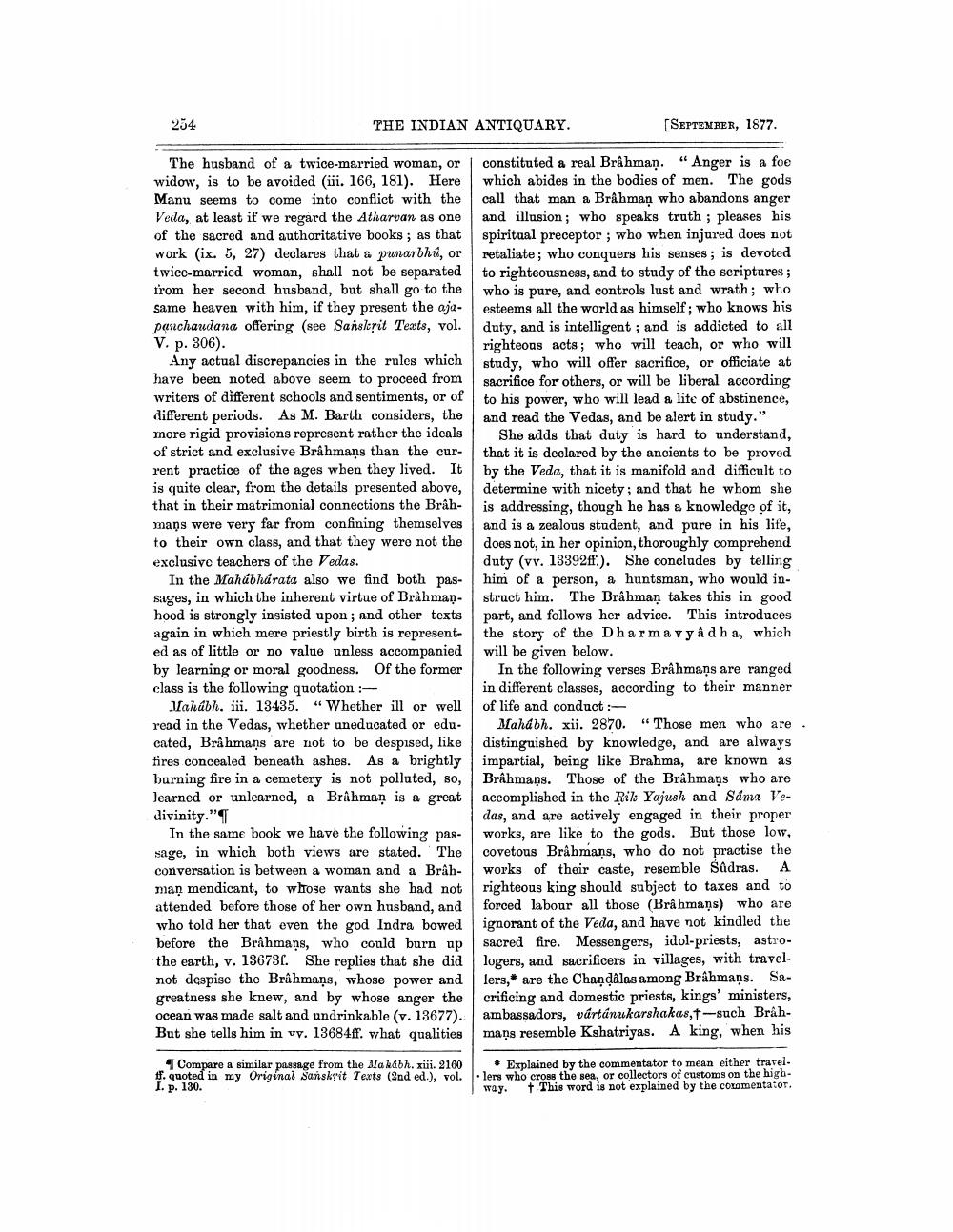________________
254
THE INDIAN ANTIQUARY.
[SEPTEMBER, 1877.
The husband of a twice-married woman, or widow, is to be avoided (iii. 166, 181). Here Manu seems to come into conflict with the Veda, at least if we regard the Atharvan as one of the sacred and authoritative books; as that work (ix. 5, 27) declares that a punarbha, or twice-married woman, shall not be separated from her second husband, but shall go to the same heaven with him, if they present the ajapanchaudana offering (see Sanskrit Texts, vol. V. p. 306).
Any actual discrepancies in the rules which have been noted above seem to proceed from writers of different schools and sentiments, or of different periods. As M. Barth considers, the more rigid provisions represent rather the ideals of strict and exclusive Brahmaņs than the cur- rent practice of the ages when they lived. It is quite clear, from the details presented above, that in their matrimonial connections the Brahmans were very far from confining themselves to their own class, and that they were not the exclusive teachers of the Vedas.
In the Mahabharata also we find both pas- sages, in which the inherent virtue of Brahmanhood is strongly insisted upon; and other texts again in which mere priestly birth is represented as of little or no value unless accompanied by learning or moral goodness. Of the former class is the following quotation :
fahábh. iii. 13435. “Whether ill or well read in the Vedas, whether uneducated or edu. cated, Brahmans are not to be despised, like fires concealed beneath ashes. As a brightly barning fire in a cemetery is not polluted, so, Jearned or unlearned, a Brahman is a great divinity."
In the same book we have the following passage, in which both views are stated. The conversation is between a woman and a Brahmaņ mendicant, to whose wants she had not attended before those of her own husband, and who told her that even the god Indra bowed before the Brahmans, who could burn up the earth, v. 13673f. She replies that she did not despise the Brahmans, whose power and greatness she knew, and by whose anger the ocean was made salt and undrinkable (v. 13677). But she tells him in vv. 13684ff. what qualities
constituted a real Brâhman. "Anger is a foe which abides in the bodies of men. The gods call that man a Brâhman who abandons anger and illusion; who speaks truth; pleases his spiritual preceptor ; who when injured does not retaliate; who conquers his senses; is devoted to righteousness, and to study of the scriptures; who is pure, and controls lust and wrath; who esteems all the world as himself; who knows his duty, and is intelligent, and is addicted to all righteous acts; who will teach, or who will study, who will offer sacrifice, or officiate at sacrifice for others, or will be liberal according to his power, who will lead a lite of abstinence, and read the Vedas, and be alert in study."
She adds that duty is hard to understand, that it is declared by the ancients to be proved by the Veda, that it is manifold and difficult to determine with nicety: and that he whom she is addressing, though he has a knowledge of it, and is a zealous student, and pure in his life, does not, in her opinion, thoroughly comprehend duty (vv. 13392ff.). She concludes by telling him of a person, a huntsman, who would instruct him. The Brahman takes this in good part, and follows her advice. This introduces the story of the Dharma vyâdha, which will be given below.
In the following verses Brahmans are ranged in different classes, according to their manner of life and conduct :
Mahabh. xii. 2870. "Those men who are . distinguished by knowledge, and are always impartial, being like Brahma, are known as Brâhmans. Those of the Brâhmaņs who are accomplished in the Rik Yajush and Sama Vedas, and are actively engaged in their proper works, are like to the gods. But those low, covetous Brahmans, who do not practise the works of their caste, resemble Sadras. A righteous king should subject to taxes and to forced labour all those (Brå hmaņs) who are ignorant of the Veda, and have not kindled the sacred fire. Messengers, idol-priests, astrologers, and sacrificers in villages, with travellers, are the Chandalas among Brahmang. Sacrificing and domestic priests, kings' ministers, ambassadors, vártánukarshakas,t-such Brahmans resemble Kshatriyas. A king, when his
Compare a similar passage from the Malabh. xii. 2160 tf. quoted in my Original Sanskrit Texts (2nd ed.), vol. I. p. 130.
# Explained by the commentator to mean either travel. lers who cross the sea, or collectors of customs on the highway. This word is not explained by the commentator.




